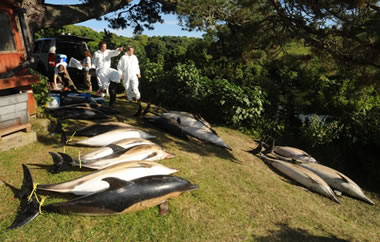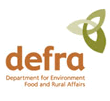Mass Stranding of common dolphins in Cornwall
ZSL MEDIA RELEASE, 12th June 2008

Mass stranding of common dolphins in Cornwall June 2008 © PA Photos
Common dolphin mass stranding investigation
Scientists from the Zoological Society of London (ZSL) are leading the investigation into the mass stranding of common dolphins (Delphinus delphis) that occurred around the south Cornwall coastline earlier this week.
Twenty six common dolphins were found dead or died during the course of the mass stranding event. Eleven dolphins have already undergone initial post-mortem examination by ZSL scientists and colleagues at the site of the stranding and a further six dolphins have been transported to ZSL’s pathology laboratories for examination, along with samples from the initial investigations. An additional nine individuals have also been examined at the Veterinary Laboratory Agency (Polwhele).
Rob Deaville, Project Manager for the UK Cetacean Strandings Investigation Programme, stated, “At present no conclusions can be made on the cause of the stranding. We are currently undertaking detailed post-mortem examinations on all of the stranded dolphins and will also be conducting a number of further tests. Until the investigation is complete, it is not possible to comment with any confidence on any potential reason/s for the strandings that took place on Monday. ZSL will ensure that complete and comprehensive examinations are undertaken on all of the animals and are grateful to the UK Government who has funded this investigation.”
Once all the post-mortem investigations have been concluded and the results analysed, further details will be released.












